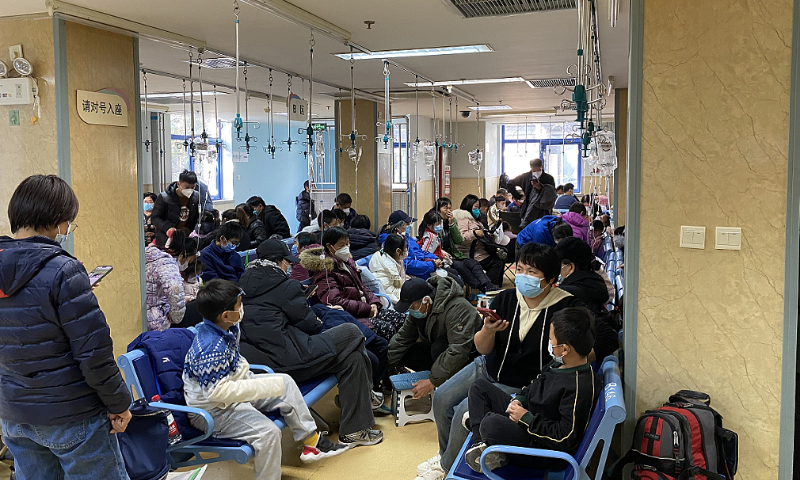Chinese health authority, experts emphasize importance of vaccination amid global rise of pertussis cases

China's health authority issued a guidance on preventing pertussis, commonly known as whooping cough or 100-day cough, on Tuesday, while the disease has reportedly been surging in many countries and regions across the world.
Pertussis is an acute respiratory infectious disease caused by Bordetella pertussis. It is highly infectious, mainly spread through respiratory droplets, while recovery tends to take a long while. It is one of the most common childhood diseases and also one of the major causes of infant and young child mortality worldwide, according to a post released by the Chinese National Disease Control and Prevention Administration on its social media account.
Vaccination is the most economical and effective way to prevent pertussis, and is important in reducing the severity and mortality after pertussis infection, the post noted, citing Zheng Hui, an expert from the Chinese Center for Disease Control and Prevention (China's CDC).
Zheng urged Chinese parents to get their children vaccinated against pertussis as soon as possible. "The protective antibodies obtained through natural recovery or vaccine immunity against pertussis cannot last a lifetime. With time, the protective effect of antibodies will decrease, so pertussis can occur in people of all ages, with infants and young children at higher risk. The younger the child, the higher the risk of complications and severe illness," he explained.
China included the vaccine protecting against diphtheria, tetanus, and pertussis (DTP3) into the national immunization program in 1978.
Since then the reported incidence rate of pertussis had decreased by about 900 times by 2013, according to the Science and Technology Daily.
However, the incidence rate has been on the rise since 2014. This year, the trend of sharp increase is even more pronounced with the total number of pertussis cases in January and February reaching 32,380, nearly 23 times higher than the same period in 2023 and close to the total number of cases for the entire previous year. There were also 13 deaths from the disease reported in the two months, according to data released by China's CDC.
Besides China, spiking pertussis cases have also observed in many other countries and regions across the world.
According to a report from the South China Morning Post on Tuesday, the number of whooping cough cases recorded in the first three months of 2024 in the Philippines was 30 times that of the same period in 2023, when the health department tallied just 28 infections. The climbing infections have led to at least 49 deaths among young children in the Philippines this year.
Pertussis has also been spreading across Europe in recent months, according to Politico. In 2023, a total of 853 cases were recorded in England. In February of this year alone, there were 913 cases, Politico said citing the UK Health Security Agency (UKHSA). The figures reportedly constitute the biggest outbreak of whooping cough in England in at least 10 years.
The current European hotspot is Croatia, which reported 6,261 cases in the first two and a half months of this year, according to Politico.
In 2022, there were more than 62,500 cases of pertussis globally and nearly 39,000 cases were reported in the Western Pacific Region, according to the World Health Organization.
The reasons for the increasing incidence of pertussis include weakening of vaccine immunity over time, according to Chinese experts. They called for improvement of pertussis monitoring systems, promotion of pertussis vaccine research and development and optimization of immunization strategies.
The DTP vaccine includes whole-cell and acellular vaccines, which have undergone three generations of processes. The earliest whole-cell process used inactivated bacteria, which had good efficacy but caused strong reactions after vaccination. Starting in 2007, China gradually implemented the strategy of replacing whole-cell DTP vaccines with acellular DTP combination vaccines, completing the full replacement by 2012, Tao Lina, an expert on Chinese vaccine industry, told the Global Times on Tuesday.
Currently, the acellular DTP vaccine widely used in China is a co-purified process vaccine, which belongs to the second generation of pertussis vaccines. However, the effective antigen components cannot be accurately quantified, and production and quality control faces challenges. In contrast, the DTP vaccines applied in developed countries are all third-generation component pertussis vaccines, with higher technical requirements and vaccine costs. The main manufacturers are Sanofi Pasteur and GlaxoSmithKline, according to Tao.
As to the optimization of the country's immunization strategy, Tao said that one adjustment that can be made is to advance the first dose from 3 months to 2 months of age.
Several Chinese vaccine companies have been reportedly investing in developing third-generation DTP vaccines, including Chongqing Zhifei Biological Products, Hualan Vaccine Inc and CanSino Biotech.
According to an announcement released by CanSino on August 14, 2023, their acellular DTP vaccine for infants and young children has started Phase III clinical trials and completed the enrollment of the first subject. In addition, the company is also developing a vaccine for adolescents and adults, which was officially approved for clinical trials in June 2023.
Hualan Vaccine's 2023 annual report also revealed that their acellular DTP vaccine has entered clinical trials, with Phase III clinical trials expected to begin in 2024.